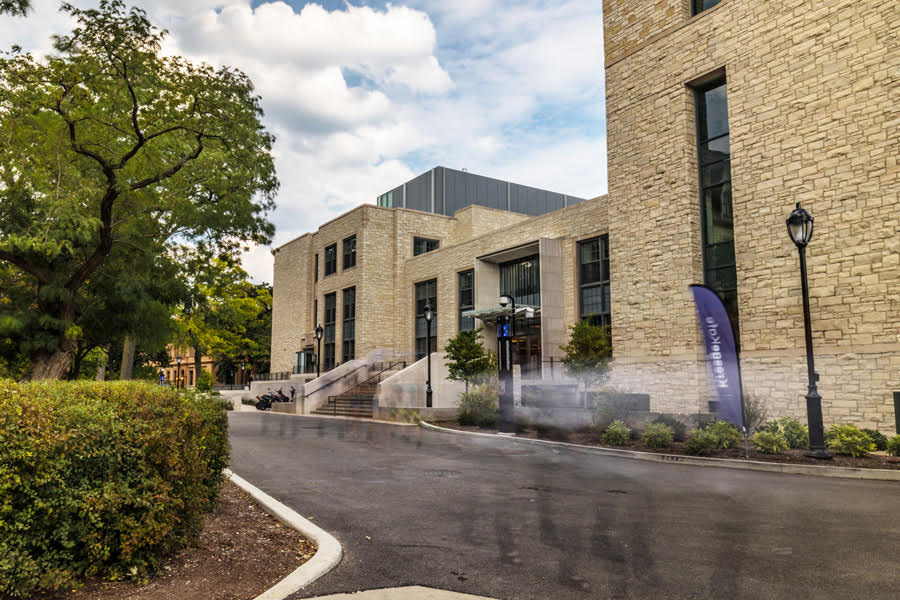Through intersectional representation, Queertopia builds “worlds that we wanted”
Daily file photo by Alec Carroll
Kresge Centennial Hall. Queer Pride Graduate Students Associated hosted Queertopia for the 13th year.
March 1, 2020
Queertopia, an annual academic conference on LGBTQ research, hosted presentations that highlighted queer intersectionality, coalition and equity this Saturday.
The 13th iteration of the conference held at Kresge Hall, was organized by the Queer Pride Graduate Student Association, a group of more than 400 graduate students focused on advocacy, service and academic development.
The day-long conference commenced with a keynote address by Kim Hunt, executive director of Pride Action Tank, an incubator on advancing Chicago-area LGBTQ communities. She spoke about “the need to move from tearing down oppressive systems” to community building with the goal of liberation.
QPGSA event organizers said this mindset reverberated in the research presentations. Attendees also watched and discussed “Criminal Queers,” a 2013 film on queer and transgender individuals in the prison industrial complex.
The conference is one of the few in the nation which examine gender and sexuality studies led from the unique perspective of graduate students, Addie Shrodes, a QPGSA executive board member and Ph.D. student who helped organized the event for the last three years, said.
“My understanding is that there are very few,” she said. “This is the only conference I know that is graduate student-led and for graduate students.”
The QPGSA committee for Queertopia is responsible for organizing, raising funds and soliciting calls for abstracts from students — mostly from the Midwest but recently from other parts of the United States — to present at the conference.
Panels, which highlighted justice, healthcare, artistic expression and displacement in the LGBTQ community, included presentations on lesbian television production, queer theology and queer online spaces in South Asia.
Shrodes said Queertopia provides a platform for burgeoning LGBTQ academics to present their findings, and that representation across intersections of identity help create “worlds that we wanted in the present.”
“It’s just a really wonderful opportunity for early-stage scholars and graduate students to present here for the first time,” she said. “We love to create that opportunity for people to feel like they can explore and feel comfortable, and get feedback and be in a supportive space.”
Organizers also said the presentations are based on recent efforts for the QPGSA to bring more inclusion into their executive board and practices. Erique Zhang, a QPGSA executive board member, said even though the University administration is willing to pay “lip service” to organizers, they have been slow in putting changes to action.
Through Queertopia, QPGSA seeks to look beyond white, cisgender LGBTQ males to serving groups that are underrepresented, even in the queer community.
“We’re in an institution where the administration has demonstrated that they are not sympathetic to certain groups of people that they are (willing to) pay lip service,” Zhang said. “A lot of what we’ve been trying to do as an organization is making sure that we amplify those voices, and that we also work in coalition with other groups.”
The conference emphasizes collation and community building between groups representing marginalized communities, they said.
Annie Howard, (Medill ’17) an alum who presented their research on transgender individuals in future digital and physical spaces, said they appreciated being able to talk to very different people about their papers.
“Just to see the really intentional creation of space that the organizers have made in bringing so many cool people together was rewarding,” Howard said. “I didn’t know what I was going to learn from today. I just knew I was going to learn a lot, and definitely did. It’s hard to make space, queer space.”
Email: yunkyokim2022@u.northwestern.edu
Twitter: @yunkyomoonk
Related Stories:
– Profile: Advocacy, community, and academia at Queer Pride Graduate Student Association
– Communication graduate students put up all-gender restroom signs, advocate for access



